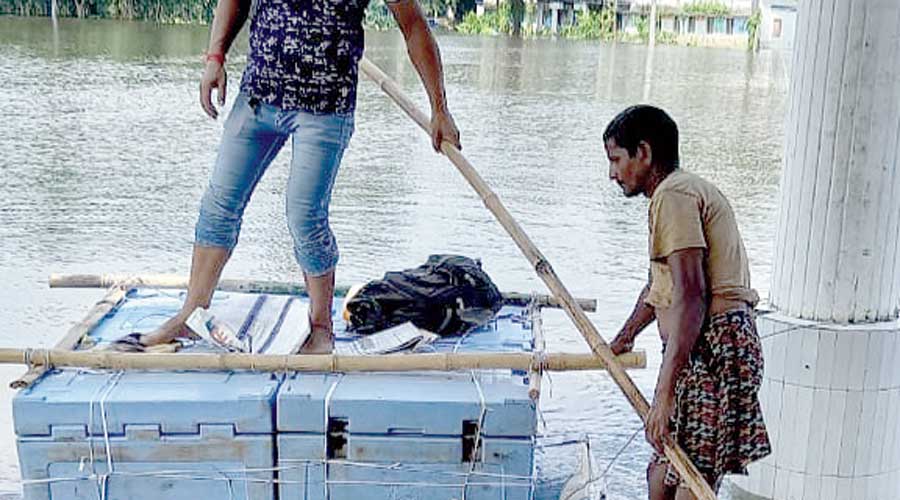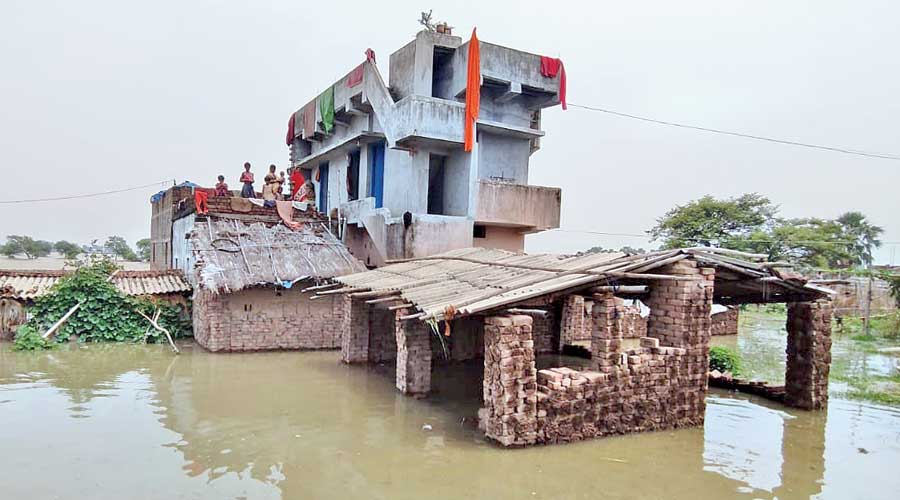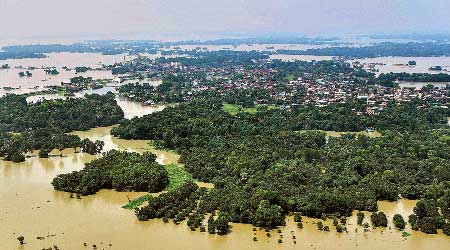When floodwaters cut off the community health centre at Dighwara in Bihar’s Saran district a week ago, its staff decided to think out of the box.
Or rather, think about the boxes — the plastic crates in which Covid vaccine doses are stored.
The staff tied these sturdy but light containers together to build makeshift rafts so they could row the patients across nearly a kilometre of four-to-five-feet-deep water to the community health centre, built in the middle of a vast field.
The doctor in charge of the CHC, Roshan Kumar, told The Telegraph: “Our staff saw the plight of the people and realised it was futile to wait for the water to recede.
“So they built the rafts using damaged vaccine boxes. It takes a 15-minute ride on these improvised boats to reach the hospital.”
Sources said the CHC had built three rafts, each with four boxes, each capable of ferrying two or three patients at a time to the CHC across the floodwaters of the Gandak and its tributaries.
“Over 20 patients of dog bites, snakebites or scorpion stings, or people injured in accidents and fights, are coming daily to the hospital,” Dr Kumar said.
“Our doctors and other staff too are finding it easier to reach the hospital.”
However, the handful of makeshift rafts being inadequate for the hundreds of Covid vaccine seekers who come to the CHC every day, the vaccination campaign has been shifted to a school built on higher ground at Dighwara Bazar.
Still, the number of jabs administered daily has fallen to around 400 from the pre-flood figure of about 1,000, Dr Kumar said.
A team of inspectors from the World Health Organisation, who arrived at the CHC on Saturday as part of a routine countrywide monitoring of the Covid vaccination campaign, however, objected to the vaccine cases being used to ferry patients and staff.
The WHO inspectors feared that the use of these insulated “cold boxes” to build rafts would hit the CHC’s capacity to store the Covid vaccines.
Dr Kumar, however, told this newspaper the CHC had built its rafts only with “damaged vaccine cases that had been declared unfit for reuse”. He said the CHC had enough cold boxes in good condition to store the vaccines.
With the matter coming to light, the district administration gave the CHC a boat on Saturday but without a boatman.
“The circle officer provided a boat after the (critical) remarks from WHO officials, but no boatman,” Dr Kumar said.
A boat can carry seven to eight passengers at a time but Dr Kumar said the CHC staff were still using the rafts because rowing a boat is a specialised job.
“There already was another boat around here but that too has been without a boatman. Using a boat on our own is very cumbersome and takes much time,” he said.
While the CHC at Dighwara has partly solved its problem, hundreds of other primary health centres (PHCs), health sub-centres, CHCs and sub-divisional and district hospitals too are believed to have been affected by floods. At least 17 of Bihar’s 38 districts are flood-hit.












